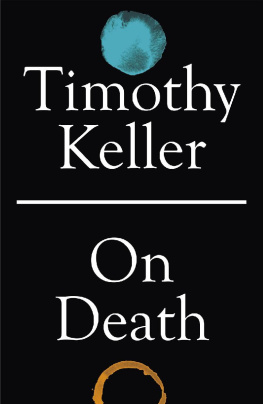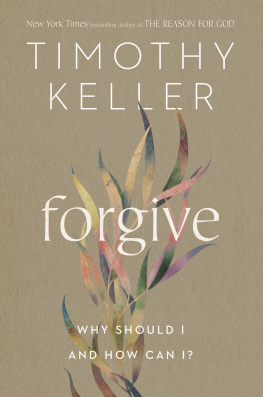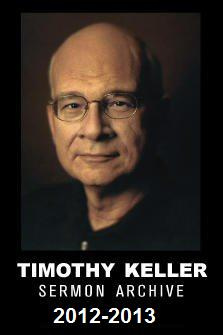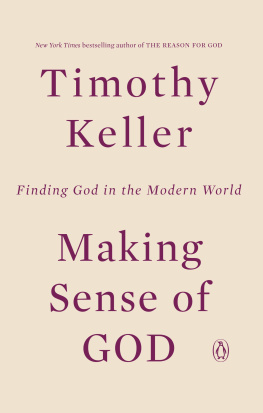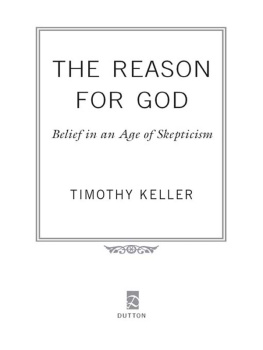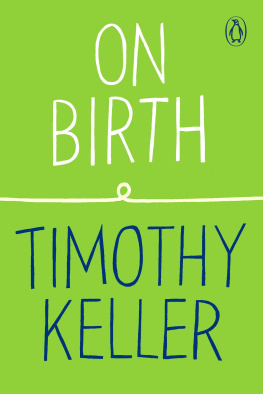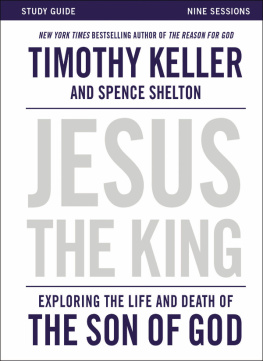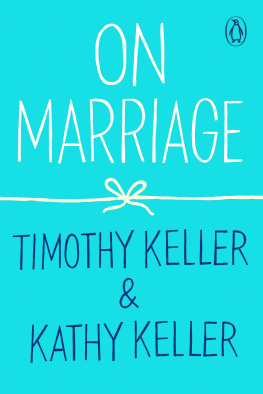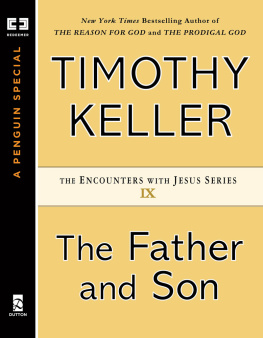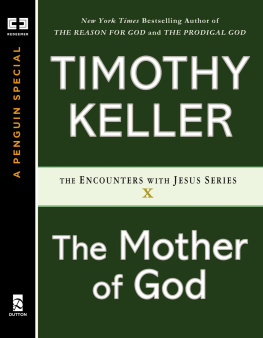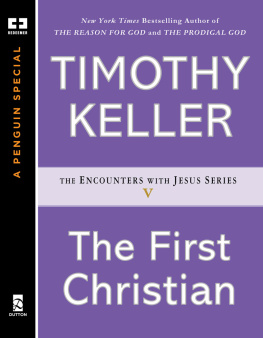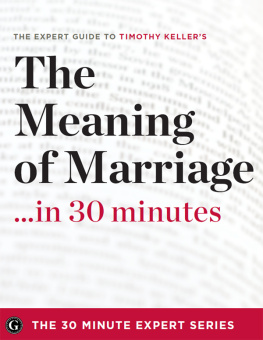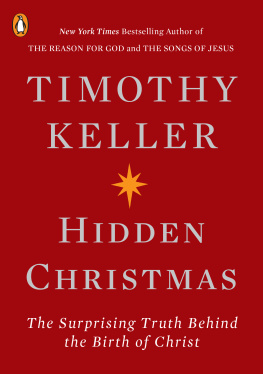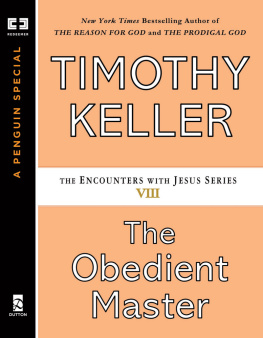About the Author
Timothy Keller started Redeemer Presbyterian Church in New York City with his wife, Kathy, and their three sons. Redeemer grew to nearly 5,500 regular Sunday attendees and helped to start more than three hundred new churches around the world. In 2017 Keller moved from his role as senior minister at Redeemer to the staff of Redeemer City to City, an organization that helps national church leaders around the world reach and minister in global cities. He is the author of The Prodigal Prophet , The Way of Wisdom , as well as The Meaning of Marriage , The Prodigal God , and The Reason for God , among others.
ALSO BY TIMOTHY KELLER
The Reason for God
The Prodigal God
Counterfeit Gods
Generous Justice
Kings Cross
Every Good Endeavour
Walking with God Through Pain and Suffering
Encounters with Jesus
Prayer
Preaching
Making Sense of God
Hidden Christmas
The Prodigal Prophet
On Birth
WITH KATHY KELLER
The Meaning of Marriage
My Rock; My Refuge
The Way of Wisdom
A Seal upon the Heart
On Marriage
ON DEATH
Timothy Keller

www.hodderfaith.com
In memory of Terry Kristy Hall,
who told us in no uncertain terms what she wanted
to be said at her funeral.
And with thanks to her siblings, Sue, Steve, and Lynn,
who wanted to see it printed. That started the whole
ball rolling. She would have been so pleased.
Contents
Introduction to the How to Find God Series
L ife is a journey, and finding and knowing God is fundamental to that journey. When a new child is born, when we approach marriage, and when we find ourselves facing deatheither in old age or much earlierit tends to concentrate the mind. We shake ourselves temporarily free from absorption in the whirl of daily life and ask the big questions of the ages:
Am I living for things that matter? Will I have what it takes to face this new stage of life? Do I have a real relationship with God?
The most fundamental transition any human being can make is what the Bible refers to as the new birth (John 3:18), or becoming a new creation (2 Corinthians 5:17). This can happen at any time in a life, of course, but often the circumstances that lead us to vital faith in Christ occur during these tectonic shifts in life stages. Over forty-five years of ministry, my wife, Kathy, and I have seen that people are particularly open to exploring a relationship with God at times of major life transition.
In this series of short books we want to help readers facing major life changes to think about what constitutes the truly changed life. Our purpose is to give readers the Christian foundations for lifes most important and profound moments. We start with birth and baptism, move into marriage, and conclude with death. Our hope is that these slim books will provide guidance, comfort, wisdom, and, above all, will help point the way to finding and knowing God all throughout your life.
Foreword
A s we age, Tim and I find ourselves encountering death, both pastorally and personally, more and more often. Our closest friends and family are now beginning to die. Over the last eighteen months, we have had three deaths in our family; in just the past three months we have talked to both a friend and a family member about how to face their impending deaths. Much of what we say in those conversations is in this book.
The foundation of On Death is a sermon preached by my husband at my sister Terry Halls funeral on January 6, 2018. She died on Christmas Day, at home, surrounded by family after a lengthy struggle with metastatic breast cancer. She knew she was dying and spent time leaving instructions for us on the hymns, prayers, and other elements she wanted for her funeral service. She was adamant that Tim should preach the Gospel at her funeral and not merely talk about her life (as much as we loved and admired her). She knew that death tends to concentrate the mind wonderfully and she wanted those present at her funeral to be prepared for their own deaths.
This book is dedicated to her, and to her husband, Bob, and daughters, Ruth Hall Ramsey and Rachael Hall. The sermon that day was, by all accounts, moving and memorable. The request to have it published came from her sisters, Sue and Lynn, and her brother, Steve.
KATHY KELLER
JULY 2018
The Fear
of Death
Conscience Makes Cowards of Us All
that by his death he might break the power of him who holds the power of deaththat is, the deviland free those who all their lives were held in slavery by their fear of death.
HEBREWS 2:1415
D eath is the Great Interruption, tearing loved ones away from us, or us from them.
Death is the Great Schism, ripping apart the material and immaterial parts of our being and sundering a whole person, who was never meant to be disembodied, even for a moment.
Death is the Great Insult, because it reminds us, as Shakespeare said, that we are worm food.
[We are] literally split in two: [Man] has an awareness of his own splendid uniqueness in that he sticks out of nature with a towering majesty, and yet he goes back into the ground a few feet in order to blindly and dumbly rot and disappear forever.
Death is hideous and frightening and cruel and unusual. It is not the way life is supposed to be, and our grief in the face of death acknowledges that.
Death is our Great Enemy, more than anything. It makes a claim on each and every one of us, pursuing us relentlessly through all our days. Modern people write and talk endlessly about love, especially romantic love, which eludes many. But no one can avoid death. It has been said that all the wars and plagues have never raised the death tollit has always been one for each and every person. Yet we seem far less prepared for it than our ancestors. Why is that?
The Blessing of Modern Medicine
One reason is, paradoxically, that the great blessing of modern medicine has hidden death from us. Annie Dillard, in her novel The Living , devotes an entire page to the astonishing variety of ways death snatched the living from the midst of their homes and families without a moments notice in the nineteenth century.
Women took fever and died from having babies, and babies died from puniness or the harshness of the air. Men died from rivers and horses, bulls, steam saws, mill gears, quarried rock, or falling trees or rolling logs. Children lost their lives as hard things smashed them, like trees and the ground when horses threw them, or they fell; they drowned in water; they sickened, and earaches wormed into their brains or fever from measles burned them up or pneumonia eased them out overnight.
Death was something that people used to see up close. To take just one example, the prominent British minister and theologian John Owen (16161683) outlived every one of his eleven children, as well as his first wife. Since people died where they lived, at home, Owen literally saw nearly every person he loved die before his eyes. The average family in the United States in colonial times lost one out of every three children before adulthood. And since the life expectancy of all people at that time was about forty years, great numbers lost their parents when they were still children. Nearly everyone grew up seeing corpses and watching relatives die, young and old.
Medicine and science have relieved us of many causes of early death, and today the vast majority of people decline and die in hospitals and hospices, away from the eyes of others. It is normal now to live to adulthood and not watch anyone die, or even see a corpse except in the brief glance of an open coffin at a funeral.
Atul Gawande and others have pointed out that this hiddenness of dying in modern society means that we of all cultures live in denial of the inexorability of our impending death. Psalm 90:12 called readers to number our days that we may gain a heart for wisdom. There has always been a danger that humans would live in denial of their own death. Of course we know intellectually and rationally that we are going to die, but deep down we repress it, we act as if we are going to live forever. And, according to the psalmist, thats not wise. It is the one absolute inevitability, yet modern people dont plan for it and dont live as if it is going to happen. We avoid doctors out of fear, denying the mortality of our bodies and assuming they will just go on forever. And yet in the face of imminent death we then demand unrealistic and extreme medical procedures.
Next page
